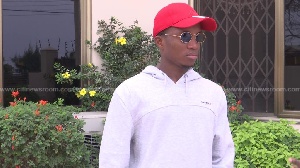- Home - News
- TWI News | TV
- Polls
- Year In Review
- News Archive
- Crime & Punishment
- Politics
- Regional
- Editorial
- Health
- Ghanaians Abroad
- Tabloid
- Africa
- Religion
- Election 2020
- Coronavirus
- News Videos | TV
- Photo Archives
- News Headlines
- Press Release
General News of Friday, 18 May 2007
Source: GNA
Journalists call for constitutional changes
Koforidua, May 18, GNA- Media practitioners and managers in the Eastern Regional have called for pragmatic measures towards propping-up journalism practice in the country to make it more proactive and responsive to dictates of constitutionalism and the felt needs of the people.
In particular, they are calling for constitutional amendments that will empower the National Media Commission (NMC) with the power to license as well as sanction journalists, akin to the norm with similar professional groupings such as the medicine, pharmacy, architecture, engineering and teaching.
Discussing a Democratic Consolidation Strategy paper at Koforidua on Wednesday, they contended that without adequate regulatory safeguards, media practice in Ghana could end up in deep throes which could counter-balance improvements being made in other sectors of national life. The Democratic Consolidation Strategy paper is an initiative of the IEA and it seeks to analyze the shortcomings of Ghana's democratic practice since the coming into force of the 1992 constitution of the Republic.
The discussion afforded the media practitioners to engage in soul-searching and to seek ways of cleansing-up the mess being wrought by a section of the media which have failed to strike a balance between constitutional guarantee of media freedom with the need to protect individual liberty.
The journalists agreed with the three-member IEA consultants led by Dr Yaw Twumasi, Professor of Political Science, that it was time the NMC is empowered to regulate the media in Ghana and help prune the media landscape of un-journalistic diatribes that often leads to creating hostility and tension among the populace.
The discussants agreed that whether trained or otherwise, all journalists in Ghana must be licensed, however, the purpose of licensing must solely aim at instigating professionalism and should neither have a caveat to curtail the practice itself nor to make it pander to sectional interests or pliant to political shadings.
The discussants also agreed that state-sponsored advertisements be shared equitably amongst all media houses regardless of whether a particular house supports a sitting government or otherwise. A Research Fellow of the Centre for Social Policy Studies of the University of Ghana and a member of the IEA team, Dr. William Kofi Ahadzie, said it must be the abounded interest of the government to ensure the survival of all newspapers whether they support its strategy of governance or otherwise. Dr. Ahadzie said African governments should not be afraid of newspapers that expose weaknesses either in the government or the society at large since by so doing leaders are made more accountable to the people. On concerns that the current media regulatory framework could unwittingly encourage foreigners to dominate ownership of media institutions in Ghana, Mr Kwamena Ahwoi, a Lecturer at the Ghana Institute of Management and Productivity and an IEA consultant, said the concern could be resolved through an appropriate regulatory enactment.










